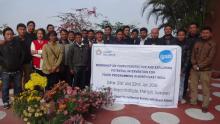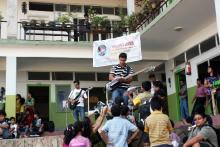Endosulfan –‘the secret killer’ is still active in India whereas the United States has decided to ban the use of it recently after a lengthy scientific review. It is an inexpensive organochlorine pesticide that builds up the environment. Endosulfan affects kidneys, foetus increases risk of testicular, and prostate cancer in men, breast cancer in women and mutagenic.
Not only the grains and vegetables, even that most of fruits and vegetables are largely unfit for human consumption due to their high chemical content, pesticides continue to be used recklessly in the fields of India including tea gardens of Assam. Punjub a province of India, which is called the ‘Granary of India’ constitutes 2.5 percent of the total agricultural land in the country, but consumes more than 18 per cent of the total pesticides used in India
Endosulfan –‘the secret killer’ is still active in India whereas the United States has decided to ban the use of it recently after a lengthy scientific review. It is an inexpensive organochlorine pesticide that builds up the environment. Endosulfan affects kidneys, foetus increases risk of testicular, and prostate cancer in men, breast cancer in women and mutagenic
In a news published in SCIENCE, 18 June 2010 (VOL 328) Noami Lubric from Zurich (Switzerland) reports the U. S. Environmental Protection Agency (EPA) ruled that the compound- which has a variety of uses from Florida’s tomato crop to California’s cotton should be phased out on a schedule to be negotiated with the manufacturer . It is to be noted more than 60 other countries for a ban. But the holdouts – including India and China argue that the pesticide should continue to be permitted where farmers cannot ford substitutes. It is unfortunate that India’s representataives at last year’s annual meeting of POPRC (Persistent Organic Pollutants Review Committee argued that endosulphan is not toxic to humans or the environment at levels currently detected. India also questioned whether Indian users the source of “long-range transport.”
The report by Noami Lubric says that when POPRC holds its next meeting in October to concider the socioeconomic impacts of restricting endosulfan use, India is expected to make the argument that a ban would harm poor farmers. The Indian Government owns the country’s main producer of endosulphan, Hindustan Insecticides Limited. Environmental groups say China, another major endosulphan manufacturer and user, is likely to support India’s position.
USEPA concluded that endosulphan poses a hazard to both wildlife and humans, citing eviedence of fish deaths downstream from treated areas and indications of neuro-degenerative impacts in animals, with implications of humans, particularly farm workers. Among recent data cited by EPA is a study published online earlier this year in Ecotoxicology showing that fish at lower trophic levels in the Everglades may retain endosulphane in tissues and pass it on to wading birds that feed on them. (Compounds that collect in tissues and are passed to predators up the food chain are said to “bioacumulate.” Previous studies have detected low levels of endosulphan in Arctic animals’ tissues, a key indicator of bioaccumulation. Other studies have found traces of endosulphan in human breast milk.
The Health Ministry of Federal government of India has issued a warning about adulaterated fruits and vegetables but doing nothing against endosulphan. The state (provincial) government of Kerala last month (July 2010) finally announced a relief package for victims of endosulphan pesticide. But the noise is yet to reach other states of India where different variety of pesticides use and its impact is much greater.
Other “Silent Killers” active in India
# Heptachlore: Reproductive disorders, blood dyscariasis
# Chlorodane: Reproductive disorders, blood discariasis, non
Hodgkins lymphoma
# Fenthion : Mutagenic, carcinogenic
# Dimethoate: Reproductive disorders, carcinogenic
# Acephate : Carcinogenic, mutagenic
# Permithion: Neurotic complications in children, carcinogenic
# Deltamethrin: Potential endocrine disruptor
# Carbaryl: Genetic mutation,effects kidney, nervous system, non
Hodgkins lymphoma
# Mancozeb: Goiter, birth defects
# Captan: Mutagenic, carcinogenic
# Carbendazim: Affects male reproductive organs
# Simazine, Astrezine: Cancer of testes
By Chandan Kumar Duarah
Address of the writer: C K Duarah, Science Writer, Sadin Publications, Chandmari, Guwahati Assam,781003By Chandan Kumar Duarah






Comments
Pages
Add new comment